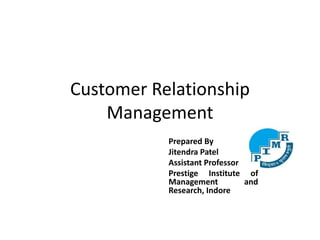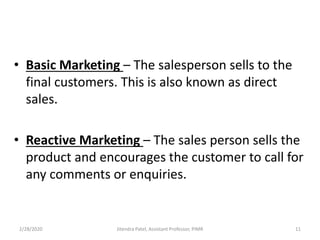Customer relationship management
- 1. Customer Relationship Management Prepared By Jitendra Patel Assistant Professor Prestige Institute of Management and Research, Indore
- 2. Content 1. Customer Relationship Management (CRM) Definition. 2. Purpose and Benefits of CRM 3. Relationship Marketing 4. Components of CRM 2/28/2020 2Jitendra Patel, Assistant Professor, PIMR
- 3. 2/28/2020 3Jitendra Patel, Assistant Professor, PIMR
- 4. Customer Relationship Management (CRM) can streamline and automate your business processes. 2/28/2020 4Jitendra Patel, Assistant Professor, PIMR
- 5. CRM = Customer Relationship Management A CRM system is a business tool that allows you to manage all your customers, partners and prospects information all in one place. For example, it helps: ŌĆósales teams close deals faster ŌĆómarketing manage campaigns and track lead generation ŌĆóservice call centres reduce the time to resolve customer complaints 2/28/2020 5Jitendra Patel, Assistant Professor, PIMR
- 6. To successfully undertake CRM initiatives it is essential to : ŌĆó Clearly define the management objective & strategy ŌĆó Evolve the right process around it ŌĆó Identify the right software solution for implementation ŌĆó Understand the hidden costs and hurdles ŌĆó Back it up with good training and support ŌĆóWhile selecting the software solution for your implementation, ensure that It can manage both your data and process ŌĆó It is easy to implement and roll out ŌĆó It is simple to use ŌĆó You understand the total cost of ownership ŌĆó You evaluate the risk exposure2/28/2020 6Jitendra Patel, Assistant Professor, PIMR
- 7. Advantages Of CRM Using CRM, a business can: ŌĆó Provide better customer service ŌĆó Increase customer revenues ŌĆó Discover new customers ŌĆó Cross sell/Up Sell products more effectively ŌĆó Help sales staff close deals faster ŌĆó Make call centers more efficient ŌĆó Simplify marketing and sales processes 2/28/2020 7Jitendra Patel, Assistant Professor, PIMR
- 8. ŌĆó Relationship marketing has the aim to building mutually satisfying long term relationship with key parties in order to earn and retain their business. ŌĆó Relationship marketing builds strong economic, technical and social ties among the parties ŌĆó -KOTLER 2/28/2020 8Jitendra Patel, Assistant Professor, PIMR
- 9. Customer loyality and satisfaction ŌĆó Highly satisfied customer are ; ŌĆó Less price sensitive ŌĆó More likely to talk favourably about product ŌĆó More likely to refer products to others ŌĆó Remain loyal for long 2/28/2020 9Jitendra Patel, Assistant Professor, PIMR
- 10. 5 levels of relationship marketing ŌĆó Basic marketing ŌĆó Reactive marketing ŌĆó Accountable marketing ŌĆó Proactive marketing ŌĆó Partnership marketing 2/28/2020 10Jitendra Patel, Assistant Professor, PIMR
- 11. ŌĆó Basic Marketing ŌĆō The salesperson sells to the final customers. This is also known as direct sales. ŌĆó Reactive Marketing ŌĆō The sales person sells the product and encourages the customer to call for any comments or enquiries. 2/28/2020 11Jitendra Patel, Assistant Professor, PIMR
- 12. ŌĆó Accountable Marketing ŌĆō The sales person calls the customers to ensure whether the product is working as per satisfaction and if there is any problem in the product. Furthermore he also asks the customer for any suggestions / feedback to improve the service / product. Thus he is taking responsibility for the sale. 2/28/2020 12Jitendra Patel, Assistant Professor, PIMR
- 13. ŌĆó Proactive marketing ŌĆō The company works continuously with its large customers to help improve performance. This is especially seen in financial companies wherein the movement in the financial market induces the company to make changes regularly. However at the same time, these financial companies have to take care of their customers as well. Thus they take regular feedback from their large customers thereby developing their products accordingly. 2/28/2020 13Jitendra Patel, Assistant Professor, PIMR
- 14. ŌĆó Partnership Marketing ŌĆō The company works continuously with its large customers to improve its performance. 2/28/2020 14Jitendra Patel, Assistant Professor, PIMR
- 15. 10 Critical players in rm 1. Supplier 2. Distributors 3. End users 4. Employees 5. Financial firms 6. Government 7. Media 8. Allies 9. Competitors 10. General public 2/28/2020 15Jitendra Patel, Assistant Professor, PIMR
- 16. Relationship Marketing and the 4Ps Product ŌĆó More products are customized to the customersŌĆÖ preferences. ŌĆó New products are developed and designed cooperatively with suppliers and distributors. 2/28/2020 16Jitendra Patel, Assistant Professor, PIMR
- 17. Price ŌĆó The company will set a price based on the relationship with the customer and the bundle of features and services ordered by the customer. ŌĆó In business-to-business marketing, there is more negotiation because products are often designed for each customer. 2/28/2020 17Jitendra Patel, Assistant Professor, PIMR
- 18. Distribution (Place) ŌĆó RM favours more direct marketing to the customer, thus reducing the role of middlemen. ŌĆó RM favours offering alternatives to customers to choose the way they want to order, pay for, receive, install, and even repair the product. 2/28/2020 18Jitendra Patel, Assistant Professor, PIMR
- 19. Communication (Promotion) ŌĆó RM favours more individual communication and dialogue with customers. ŌĆó RM favours more integrated marketing communications to deliver the same promise and image to the customer. ŌĆó RM sets up extranets with large customers to facilitate information exchange, joint planning, ordering, and payments. 2/28/2020 19Jitendra Patel, Assistant Professor, PIMR
- 20. Properties of relationship marketing ŌĆó Collaboration ŌĆó Commitment, Dependency ŌĆó Trust, risk and uncertainty ŌĆó Power ŌĆó Longevity ŌĆó Frequency, regularity and intensity ŌĆó Closeness and remoteness 2/28/2020 20Jitendra Patel, Assistant Professor, PIMR
- 21. Ikea ŌĆō The Swedish furniture maker has a worldwide base of intensely loyal customers. When the company changed the font in their ubiquitous catalog, Ikea lovers took to the Internet to air their complaints. Rather than alienate their customers for a trivial reason, Ikea changed the font back in the next catalog. American Airlines ŌĆō The airline maintains a comprehensive frequent flyer program that rewards customer loyalty with the promise of free flights, upgrades, and discounts. Dell ŌĆō Dell computers created a special online store for high volume corporate customers. By tailoring the ordering process to the specific customer's needs, Dell was able to expedite many of the hassles corporate technology buyers face. Providing a higher level of service leads to increased loyalty. Examples 2/28/2020 21Jitendra Patel, Assistant Professor, PIMR
- 22. 2/28/2020 22Jitendra Patel, Assistant Professor, PIMR
- 23. ŌĆó Classification of CRM programs ŌĆō Loyalty program ŌĆō Prospecting ŌĆō Save or win back ŌĆō Cross-sell/up-sell ŌĆó eCRM: Customer relationship management conducted electronically 2/28/2020 23Jitendra Patel, Assistant Professor, PIMR
- 24. Components of CRM ŌĆó Customer and Product centric services ŌĆó Differential Marketing ŌĆō Mass marketing ŌĆō Focused marketing ŌĆō One-to-one marketing ŌĆó Customers are not born equal Sales Managment Database Marketing Marketing Management Service Managemen t Customer Managemen t 2/28/2020 24Jitendra Patel, Assistant Professor, PIMR
- 25. 2/28/2020 25Jitendra Patel, Assistant Professor, PIMR
- 26. 2/28/2020 26Jitendra Patel, Assistant Professor, PIMR
- 27. 2/28/2020 27Jitendra Patel, Assistant Professor, PIMR
- 28. 2/28/2020 28Jitendra Patel, Assistant Professor, PIMR
- 29. 2/28/2020 29Jitendra Patel, Assistant Professor, PIMR
- 30. 2/28/2020 30Jitendra Patel, Assistant Professor, PIMR
- 31. References 1. Boone and Kurtz , Contemporary Marketing, 16th edition, Cengage Learning, 2014 2. Philip Kotler and Gary Armstrong ŌĆ£Principles of MarketingŌĆØ, New Delhi, Prentice Hall of India, 15th Edition, 2013. 3. Philip Kotler, Kelvin Lane, Keller, Abraham Koshi, Mitihlesh Jha, Principles of Marketing Management, South Asian Perspective, Pearson Education, 14th Edition 2011. 4. Preact CRM, ŌĆ£The Insider Guide to Success with CRMŌĆØ, Microsoft Partners. 5. Sales Force, ŌĆ£Deciding which crm solution is right for you Part of the Crm success seriesŌĆØ, Sales Force Sales Cloud. 6. Tech Target, Battle of CRM Tools, Search CRM, PRO+Content. 2/28/2020 31Jitendra Patel, Assistant Professor, PIMR
- 32. 2/28/2020 32Jitendra Patel, Assistant Professor, PIMR
































